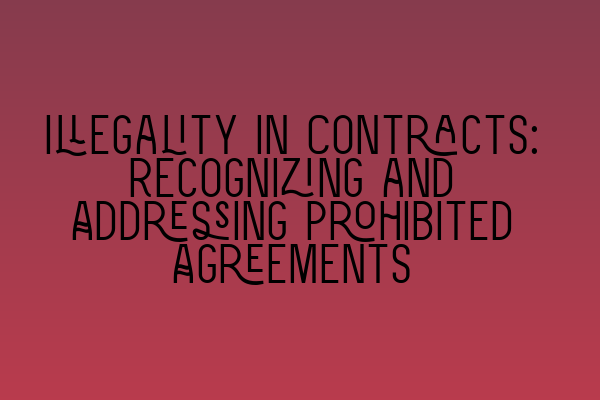Illegality in Contracts: Recognizing and Addressing Prohibited Agreements
Welcome to the SQE Contract Law blog! Today, we are diving deep into the topic of illegality in contracts. As a solicitor, it is essential to not only draft enforceable and valid contracts but also identify and address any agreements that may be deemed illegal. In this article, we will explore the concept of illegality, discuss different types of prohibited agreements, and provide practical insights on how to deal with such situations.
Understanding Illegality in Contracts
Illegality in contracts refers to agreements that are against the law or public policy. These agreements are unenforceable and may result in serious consequences for all parties involved. As a solicitor, it is crucial to recognize situations where a contract may be deemed illegal and take appropriate actions to mitigate the risks.
Types of Prohibited Agreements
Prohibited agreements can take various forms. Let’s explore some common examples:
- Contravention of Statutory Law: Contracts that involve illegal activities, such as drug trafficking or money laundering, are clear examples of prohibited agreements. It is essential to thoroughly understand relevant statutes and legislation to identify such unlawful activities.
- Breach of Public Policy: Agreements that go against public policy, which includes acts that are considered harmful or immoral, fall under this category. Examples may include contracts that promote discrimination, endanger public safety, or infringe upon human rights.
- Restraint of Trade: Contracts that contain unreasonable restraints on trade or competition may be deemed illegal. These often arise in employment contracts that restrict an individual’s ability to work in a certain field or with specific competitors.
- Illegality by Formation: Illegality may also arise from the formation of a contract itself. This can occur when the contract is based on fraud, duress, or undue influence, ultimately rendering it unenforceable.
Addressing Prohibited Agreements
When confronted with a prohibited agreement, it is crucial to navigate the situation carefully. Here are some steps to consider:
- Identify and Assess: The first step is to identify any potential illegality in the contract. Conduct a thorough review of the agreement, considering both statutory law and public policy implications. Seek legal advice to ensure an accurate assessment.
- Consider Severance: In certain cases, it may be possible to sever the illegal or unenforceable provision from the rest of the contract. This allows the remaining valid terms to be enforced. However, severance should only be pursued after careful evaluation and expert guidance.
- Renegotiate or Terminate: If the illegality impacts the core purpose of the contract, it may be necessary to renegotiate or terminate the agreement. In such cases, it is crucial to follow the proper legal procedures and communicate effectively with all parties involved.
- Learn from the Experience: Dealing with prohibited agreements can be a challenging experience. Take the opportunity to learn, review your contract drafting processes, and update your knowledge on relevant laws and regulations to prevent similar situations in the future.
For more insights on navigating legal challenges and pitfalls in your practice, check out our article on Navigating Legal Challenges and Pitfalls in Your Practice. If you’re considering a career as a solicitor and want to understand the differences between barristers and solicitors, our handy guide on Barrister vs. Solicitor: A Comprehensive Comparison is a must-read. You can also explore different solicitor specializations and find your niche by visiting our article on Exploring Different Solicitor Specializations: Finding Your Niche. Additionally, if you’re interested in pursuing a legal education, we have a comprehensive list of top law schools in the UK in our article Top Recommendations for Law Schools in the UK. Finally, you may want to learn about the rise of virtual law practices and how they are transforming the legal industry by visiting our article on Embracing the Rise of Virtual Law Practices.
Thank you for reading this article on recognizing and addressing prohibited agreements. Stay tuned for more informative content from SQE Contract Law.
